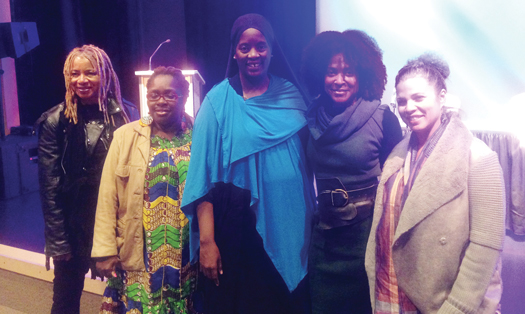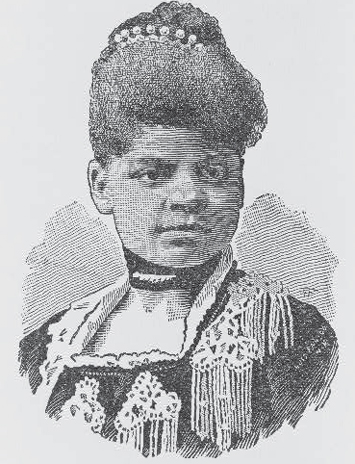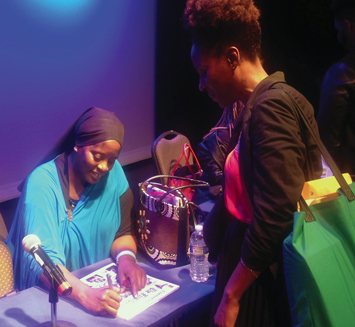Echoing Ida B. Wells
By Dezarae Muhammad | Last updated: May 10, 2016 - 11:15:52 AMWhat's your opinion on this article?

Panelists and participants during a Women’s History Month program included, Left to right: Margaret Prescod, Atty. Nana Gyamfi , Sister Charlene Muhammad, Dr. Libby Lewis and Dr. Melina Abdullah.
|
LOS ANGELES—The California State University at Los Angeles’ Student Union Theater was the scene of a riveting panel discussion honoring revered journalist and anti-lynching activist Ida B. Wells.

Ida B. Wells
Photo: Library of Congress |
Guest speakers included Attorney Nana Gyamfi, “Sister” Charlene Muhammad, national correspondent for The Final Call newspaper and Thandisizwe Chimurenga (who could not attend due to illness). The three women host various editions of the Pacifica Network’s 90.7 FM/KPFK’s morning drive-time public affairs show “Uprising”: (Gyamfi: The Asafo Edition, Muhammad: The Freedom Now Edition, and Chimurenga: The Root Work Edition). Margaret Prescod hosts KPFK’s public affairs show, “Sojourner Truth,” nationally syndicated on 150 stations, also participated.
Dr. Libby Lewis, professor of Pan-African Studies at Cal State L.A., moderated the March 30 discussion and Q&A with the diverse standing-room only audience.
“We are echoing Ida and we are very, very blessed to have women, radical Black women journalists, who take that on, and decide to tell truth, speak truth, and use their pens, use their microphones as their swords, and that’s what we’re going to be celebrating,” stated Dr. Melina Abdullah, professor and chair of the Pan-African Studies Department.
The event presented an opportunity for students to learn more about Black history, current events, and their future as a people. In other Women’s History Month programs, the angle has usually been from a single axis framework of middle class, privileged White women, according to Dr. Abdullah.

Sister Charlene Muhammad signs a copy of The Final Call newspaper featuring her cover story, “Black Girl Magic” for an attendee.
|
She documented her experience in her book, “The Myth of Post-racialism in Television News,” which focuses on how journalists negotiate race, gender, and sexuality in a corporate newsroom culture and foregrounds the experiences of Black journalists.
“When you’re a journalist and you are on the front lines of struggle, and you have to relay that struggle to the population, it does come at a price. We don’t want to forget that,” Dr. Lewis said.
Panel topics focused on issues like freedom of the press in today’s climate, and how to become an alternative or independent journalist who fights for social justice, and still “get paid.”
Atty. Gyamfi said what is not talked about enough is the degree to which many independent Black and other journalists attempting to show what mainstream media neglects, have been arrested, charged, and convicted for showing the truth.
“They’re right there on the front line in ways that other people cannot be on the front line,” she said. And in terms of the laws and the way they are being carried out, there is definitely an issue with freedom of speech, she said.
Atty. Gyamfi added, “When we have whistleblowing, and people doing what people used to do, investigative reporting, going in, Watergate, COINTELPRO, all of these things that came to before with the help of journalists, you see that now it’s a very serious thing. You end up like (Edward) Snowden, accused of terrorism or treason.”
Ms. Muhammad thanked Final Call newspaper founder, the Honorable Minister Louis Farrakhan for the privilege to write for the publication, and Richard B. Muhammad, its editor-in-chief, for now nearly two decades of mentoring and guidance.
Identify your motives and then get to work, encouraged Ms. Muhammad, who also uses her radio platform to uplift positive images of Black women in media, and Pumps on the Ground, her budding alternative media project, to the trenches to cover news on the ground when it breaks.
Ms. Muhammad stated, “Be fierce. People may tell you, like some tell me, you’re wasting your life. Some tell me I should write for mainstream media and get paid, but waste life? How can you waste your life trying to save a life?”
Ms. Prescod uses her radio activism to champion the causes like Global Women’s Strike (an international grassroots network which campaigns for the return of military budgets to the community, beginning with women careers in every country), and the Black Coalition Fighting Back Serial Murders, which is fighting for justice for Black women murdered in the 1980s and early 2000s. Lonnie Franklin, Jr. (dubbed the “Grim Sleeper”) is currently on trial for the slayings.
Work in the trenches and being grounded in community in the tradition of radical journalism are connected and they are critical, because that shapes the stories told and their impact, she said. Understand, she continued, journalism schools tell students to be objective, but objective from what?
“Objective from whose perspective? Not only that, it’s a lie! It’s just not true! … They all have a point of view. Well, we all have a point of view, and there’s nothing wrong with that,” Ms. Prescod stated.
The event exceeded her expectations, Dr. Abdullah said. “I wanted to bring awareness to what is going on in the world today, in the past, and what will be best for us to help others and ourselves,” she said.
INSIDE STORIES AND REVIEWS
-
-
About Harriett ... and the Negro Hollywood Road Show
By Rabiah Muhammad, Guest Columnist » Full Story -
Skepticism greets Jay-Z, NFL talk of inspiring change
By Bryan 18X Crawford and Richard B. Muhammad The Final Call Newspaper @TheFinalCall » Full Story -
The painful problem of Black girls and suicide
By Charlene Muhammad -National Correspondent- » Full Story -
Exploitation of Innocence - Report: Perceptions, policies hurting Black girls
By Charlene Muhammad -National Correspondent- » Full Story -
Big Ballin: Big ideas fuel a father’s Big Baller Brand and brash business sense
By Bryan Crawford -Contributing Writer- » Full Story






 Click Here Stay Connected!
Click Here Stay Connected!








